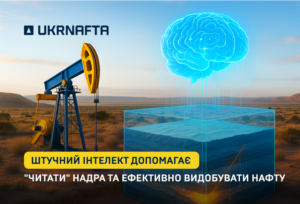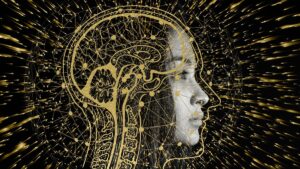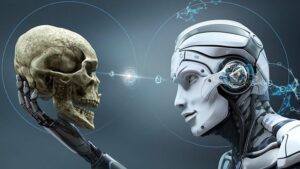
“Ukrnafta continues its digital transformation. Today, artificial intelligence is becoming one of the key tools that helps the company to work more accurately with subsoil, make more informed technological decisions and increase production efficiency.
Ukrnafta’s Research and Design Institute has created five neural network-based tools that are already changing the approach to geology and field development planning.
1. Automatic processing of large amounts of geological and industrial data.
Specialists perform data mining, recognize text and document structure in images, and automatically translate documents into Ukrainian. By July 2026, it is planned to complete the full processing of 1.8 million scanned paper carriers and create a full-fledged digital archive of geological and industrial documentation.
2. Recognizing and classifying geophysical measurement curves in images.
Neural networks significantly accelerate and improve the quality of the digitization process of scanned well logs. As a result, specialists receive the critical data they need to analyze and determine the location of productive formations and their characteristics faster. Additionally, a module has been created to automatically link a set of geophysical survey curves by depth using neural networks.
3. Automatic interpretation of lithological and petrophysical characteristics
A powerful tool for analyzing geophysical surveys that reproduces the logic of an experienced interpreter, automatically generating a preliminary forecast of important characteristics over the entire depth of the section. This allows you to clarify reservoir boundaries, find potentially productive intervals, and make field development strategies faster and more accurate.
4. Data preparation for digital 3D field models
The full cycle of preparing input data for digital field models has been automated. In fact, we are forming the basis for digital fields – digital twins that help manage the field in real time.
5. A recommendation system for selecting candidate wells for stimulation activities.
Neural networks are used to analyze the accumulated experience of technological operations and forecast possible flow rates for each well after stimulation. This approach allows us to quickly identify for further analysis exactly those facilities where workovers can provide the greatest increase in production right now.
The company carries out systematic work to effectively use the array of data accumulated over decades, combine it with the results of modern research and create a new level of accuracy in both planning and field operations.
In 2026, Ukrnafta will continue to use new technologies:
▪️ increasing the scale of digital transformation;
▪️ optimization of production processes;
▪️ prompt and most accurate production forecasting;
▪️ automation of seismic interpretation;
▪️ intelligent forecasting of equipment operation.
“Ukrnafta is moving to ensure that hydrocarbon production in Ukraine is based on accurate data, digital models and modern technological solutions, which will help to ensure the country’s energy sustainability more efficiently.
JSC Ukrnafta is the largest oil producer in Ukraine and the operator of the largest national network of filling stations – UKRNAFTA. In 2024, the company started managing the assets of Glusco. In 2025, the company finalized a deal with Shell Overseas Investments BV to buy the Shell network in Ukraine. In total, it operates 663 filling stations.
The company is implementing a comprehensive program to restore operations and update the format of its filling stations. Since February 2023, the company has been issuing its own fuel coupons and NAFTAKarta cards, which are sold to legal entities and individuals through Ukrnafta-Postach LLC.
Ukrnafta’s largest shareholder is Naftogaz of Ukraine with a 50%+1 share.
In November 2022, the Supreme Commander-in-Chief of the Armed Forces of Ukraine decided to transfer to the state a share of corporate rights of the company owned by private owners, which is now managed by the Ministry of Defense.

The international news portal Euronews has published an article about Uzbekistan’s large-scale program aimed at developing artificial intelligence infrastructure and data centers. The article emphasizes that the country offers significant tax breaks, access to cheap electricity, and support for renewable energy projects, hoping to attract more than €85 million in foreign investment in the first phase.
Euronews pays particular attention to the choice of Karakalpakstan as a key location. The region is seen as a promising center for large AI projects due to its energy advantages, cool climate, and availability of free land resources. Journalists note that the new projects will use energy-efficient and low-water cooling systems that meet the environmental conditions of the region, which has been affected by the drying up of the Aral Sea.
According to the Ministry of Digital Technologies and Research and the UNDP, the ongoing modernization of fiber optic and telecommunications infrastructure is increasing the country’s digital potential and making it attractive to major players in the industry. According to the publication, the Uzbek government is counting on an influx of investment in the artificial intelligence sector, the creation of high-tech jobs, and the development of related industries, from logistics to engineering services.
Euronews also notes that the selection of projects will be based on their export potential, focus on green energy, and plans for training local personnel. The potential of Karakalpakstan as a future hub for the export of computing power and cloud services to countries in the region is highlighted separately.
According to the portal, the initiative is integrated into Uzbekistan’s broader strategy to create a full-fledged artificial intelligence ecosystem by 2030. The plan envisages attracting more than €860 million in investments, opening new AI laboratories, forming technology clusters, and launching more than 100 AI-based projects, including solutions based on renewable energy sources. By 2030, the country intends to increase its IT services exports to €4.3 billion and strengthen its position in the global technology market.

In Uzbekistan, 2,141 positions in the executive branch will be cut by November 1, 2025, due to the introduction of artificial intelligence technologies. The corresponding decree was signed by the country’s president, Shavkat Mirziyoyev, and the document was published in the National Legislation Database.
According to the decree, the largest number of cuts will occur in the State Tax Committee (498 positions), the Ministry of Water Resources (224), the Ministry of Agriculture (200), the Ministry of Justice (197), the Ministry of Ecology (176), and the Ministry of Employment and Poverty Reduction (163).
In addition, the number of deputy heads in state committees, agencies, and inspectorates will be reduced: in some structures, the number of deputies will decrease from 11 to 7, from 12 to 6, and from 13 to 7, respectively.
The Ministry of Employment and the Federation of Trade Unions have been instructed to assist dismissed employees in finding employment and retraining.
The reform is part of a program to digitally transform public administration. In early 2025, President Mirziyoyev signed a law reforming the civil service system, which provides for the introduction of performance evaluations for civil servants and higher requirements for digital skills.
Earlier, Uzbekistan announced the creation of an Artificial Intelligence Development Alliance, which will coordinate the introduction of AI technologies in various industries and allocate funding for infrastructure development. About $100 million is planned to be allocated for these purposes.
The mass reduction of civil servants reflects the authorities’ policy of optimizing the bureaucratic apparatus and improving management efficiency through digitalization. At the same time, experts note that the success of the reform will depend on the quality of the technologies implemented and the state’s ability to provide social protection and retraining for the workers who are being laid off.

Large language models (LLM), on which ChatGPT and other generative (content-creating) artificial intelligence (AI) tools are based, will never reach the level of human intelligence, believes Jan Lekun, chief scientist of the American Meta in the field of AI.
In his opinion, such models have a very limited understanding of logic and will not be able to reason and plan like a human. In addition, they “do not understand the physical world, do not have permanent memory, are unable to reason in any reasonable sense of the word, and cannot plan … hierarchically,” he said in an interview with the Financial Times.
Lecun argued against relying on LLM development in an effort to create human-level intelligence, as these models can only accurately respond to queries if trained on correct data, and are therefore insecure.
Instead, the expert is developing an entirely new generation of AI systems that he hopes will endow machines with “human” intelligence. However, this task could take a decade to complete, he explained.
Lecun leads a team of about 500 people at Meta’s basic AI research lab. They are working on creating an artificial intelligence that can develop a sense of common sense and study the structure of the world in a similar way to humans. This approach is called “world modeling.”

A strategy session with the participation of experts, officials, MPs and lawyers was the beginning of work on the regulatory field for artificial intelligence (AI), it discussed the paths Ukraine can follow in the field of its legal regulation, said Deputy Prime Minister and Minister of Digital Transformation Mikhail Fedorov.
“We should not lag behind the rest of the world, but lead the AI trend. It is impossible to talk about a digital state if we do not form a progressive policy in the direction of artificial intelligence and agendu for the world “, – wrote Fedorov in his Telegram channel on Wednesday.
According to him, the use of AI in Ukraine is planned in various spheres, in particular, the Ministry of Digitization is developing a virtual assistant in “Diya”, the task of which is to quickly find answers to users’ questions. In addition, AI will help Gosstat to process and analyze data, added the head of the Ministry of Digitals.
Separately, Fedorov noted the usefulness of AI in military technologies. According to him, artificial intelligence helps to fix the movement of equipment and personnel of the enemy, to shoot down missiles, to more effectively target UAVs, etc.
“We are creating conditions for top international companies dealing with artificial intelligence to come to the Ukrainian market,” Fyodorov added.

The digital space is a “new frontier of fundamental rights”, a new world in which previous rules do not always apply automatically, European Commission (EC) President Ursula von der Leyen said.
“Think about children’s rights or consumer protection. But think also about artificial intelligence. Its potential benefits are enormous. But it can also be harmful, for example if it is used to hire and fire employees or to monitor citizens through facial recognition. We need new laws to embody our eternal values in the online world,” the EC chief said Friday in New York at the European Commission’s World Peace & Liberty Award ceremony.
It is an award given since 1965 by the World Bar Association for services to the defense of the rule of law as opposed to the use of force.
According to von der Leyen, Europe is leading the way in creating a legal framework for the digital age.
“We were the first in the world to set rules for digital platforms, and now we are doing the same with artificial intelligence. This means that all companies that want to operate in our market have to meet very high standards. Standards that center on people and their rights,” the President of the European Commission emphasized.
She said the EU is “working with like-minded friends such as Canada and the United States, as well as with Japan, Latin American countries and India, to develop equivalent rules so that technology enhances individual freedom rather than the ability of the state to control us”.